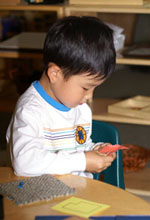Schoolhouse Montessori Academy Preprimary, Pre-school Curriculum — Inspiring a Love of Learning
“Education demands then, only this: the utilization of the inner powers of the child for his own instruction.” —

Maria Montessori
Schoolhouse Montessori Academy’s preprimary program provides a carefully planned, stimulating environment that helps children develop the foundational habits, attitudes, skills and ideas that are essential for a lifetime of creative thinking and learning.
Language Curriculum
In the Montessori classroom, children learn how letters sound, phonetically before they memorize the alphabetical names in sequence. This lets them hear what they’ll later read.
Reading instruction begins the day a child wants to know what a word says or shows interest in using sandpaper letters:
-
- Students construct words with a movable alphabet, then proceed at their own pace to begin reading.
- Using phonics skills to tackle new words, books become a source of exploration.
- Games introduce students to grammar.
Through sensorial exercises and activities designed to enhance vocabulary and language foundations, children prepare for early elementary education.
Mathematics Curriculum
When young children have access to mathematical equipment, they joyfully assimilate math facts and skills. At Schoolhouse Montessori Academy, children separate, share, count and compare materials to learn basic math operations.
They never sit down to memorize addition and subtraction facts or multiplication tables. Rather, children learn by performing the operations with a variety of materials such as beads. As they commit their math facts to memory, they gain a real understanding of what each operation means.
Sensorial Exercises
Sensorial materials help children learn to distinguish, categorize, and relate new information to what they already know. This process is the beginning of conscious knowledge, spurred when the intelligence works in a concentrated way on impressions created by the senses.
Sensorial activities at this stage build on what children learned in infant and toddler phases, integrating the same types of activities into the rest of the curriculum. Examples include:
- Math – We present children with a binomial cube that helps them learn discrimination of color and size and builds a foundation for future understanding of polynomials and volume.
- Language Arts – Children are constantly matching concepts such as color and shape to objects to build and grow vocabulary. They also learn to identify consonants and vowels, and begin learning to write through color and texture exercises.
- Science – Color discrimination is used to help children identify different parts and concepts of individual animals.
- Geography – Touch discrimination is used to help children distinguish between water and land, and later colors are used to help children discriminate between continents, then countries.
Sensorial exercises are not a single lesson tool – they are integrated into all components of Montessori education to help children learn life skills through various outlets.
Practical Life Exercises
Young children like to imitate adults doing ordinary tasks – washing dishes, paring vegetables, or polishing shoes. By promoting such activities in the classroom, we help children improve their coordination and focus their concentration. They learn to pay attention to detail and develop good work habits.
Students study the food pyramid and learn what their bodies need to be healthy. They also participate in small cooking exercises that are a continuation of practical life experiences and math lessons.
Physical Geography Curriculum
Large wooden puzzle maps are immensely popular. At first, students use them simply as puzzles. Gradually, children learn names of countries, geographical facts, and common land formations such as islands and peninsulas. By starting with the big picture and then working down to include smaller details, we create a love for the concepts of geography in our students.
Cultural Units Curriculum
Schoolhouse Montessori Academy students gain an awareness of the world around them by exploring countries, customs, food, music, climate, language and animals. The mission of Montessori education is to help students develop understanding, tolerance and compassion for all people.
Arts Curriculum
Art feeds a great joy children find in creating. Schoolhouse Montessori Academy students use their imaginations with a variety of mediums, learning that process is more important than the end-product.
Schoolhouse Montessori Academy’s creative music, movement and dramatics program is an ongoing, flexible process that integrates fully into our academics. Young children use their bodies to reflect and interpret music.
Science and Nature Curriculum
Science stimulates curiosity through discovery projects and experiments, helping children to draw their own conclusions. Our preprimary students strive to:
- Study the plant and animal kingdoms
- Develop a love and appreciation for all living things
- Use sensorial exercises focusing on color, touch and auditory discrimination to better understand the living world around them.
As children prepare to enter primary education and our lower elementary curriculum, they are taught to see nature and science with a critical eye, developing the vocabulary needed to ask and answer appropriate questions.

